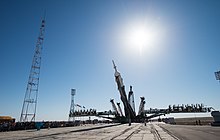ISS Horizons
| Mission dates | |||
|---|---|---|---|
| Mission: | ISS Horizons | ||
| Space station: | ISS | ||
| Start: | June 6, 2018, 11:12:41 a.m. UTC | ||
| Started by: | Launch of Soyuz MS-09 | ||
| The End: | December 20, 2018, 05:02 UTC | ||
| Ended by: | Landing of Soyuz MS-09 | ||
| Duration: | 194d 12h 39min | ||
| Team photo | |||
 Alexander Gerst in the European Columbus Laboratory , the mission logo can be seen on the left of his chest.
|
|||
| navigation | |||
|
|||
Horizons was a space mission of the European Space Agency , during which the astronaut Alexander Gerst stayed on board the International Space Station (ISS) for six months . The name of this mission says nothing about the content of the mission, but it is common for ESA astronauts to put their mission under an individual motto.
preparation
Gerst was officially selected as a spaceman by the European Space Agency ESA in May 2009. In 2014 he flew to the ISS with the Soyuz TMA-13M spacecraft and spent six months there as a flight engineer on ISS expeditions 40 and 41 .
The Director General of ESA announced on May 18, 2016 that Alexander Gerst is scheduled for a second flight to the International Space Station from June to December 2018. On October 3rd, he was the first German and second Western European to take over the role of commander for the second half of the mission . Gerst was the first of his selection group to complete a second space flight. The Canadian spaceman David Saint-Jacques replaced Gerst .
The first payloads for research and experiments carried out during the ISS Horizons were launched to the ISS on April 2, 2018 with a Falcon-9 launcher .
Planned experiments
German and other European universities, research institutions, companies and the DLR contributed 35 experiments for the mission. The experiments fell into the subject areas of biology, medicine, (astro) physics and materials science. In addition, technology demonstrations and an educational program for children and young people took place. Gerst himself acted as a test object for many medical experiments. The floating robot ball Cimon was also tested.
Mission history

Gerst took off on June 6, 2018 at 1:12:41 p.m. CEST (11:12:41 UTC) with the Soyuz MS-09 spacecraft to the ISS. The docking with the ISS took place after 34 orbits on June 8, 2018 at 3:01 p.m. CEST (13:01 UTC). He was accompanied by Sergei Prokopjew and Serena Auñón . At the station they joined Expedition 56 , which also included Commander Andrew Feustel from the USA and flight engineers Richard Arnold (USA) and Oleg Artemjew (Russia).
On October 3, 2018, Expedition 56 ended and Expedition 57 began . While Feustel, Arnold and Artemjew returned to Earth with Soyuz MS-08 , Gerst stayed on the International Space Station together with Prokopjew and Auñón. At that time, Gerst was the first German and the second Western European to take command of the ISS. The astronauts started Expedition 57 initially in threes, before two other members of the expedition, Alexei Ovtschinin and Nick Hague, were to fly to the ISS on October 11, 2018 . After the failure of the second stage of the launcher in the first few minutes of flight, the Soyuz MS-10 did not reach orbit and had to make an emergency landing. The two crew members were unharmed.
On December 20, 2018, Gerst returned to earth with Prokopjew and Auñón. The Horizons mission officially ended with the landing in Kazakhstan.
Trivia
On the flight, plush figures of the mouse, the elephant and the Mainzel male Conni were on board.
Web links
- horizons 2018. (PDF; 3.4 MB) In: ESA.int. European Space Agency, accessed December 20, 2018 .
Individual evidence
- ^ New Horizons for Alexander Gerst. In: ESA.int. European Space Agency, May 29, 2017, accessed May 29, 2017 .
- ↑ Alexander Gerst becomes the first German commander in space. In: FAZ.net. Frankfurter Allgemeine Zeitung, May 18, 2016, accessed on May 18, 2016 .
- ↑ "Horizons" - the new mission from Alexander Gerst. In: DLR.de. German Aerospace Center, May 29, 2017, accessed on April 18, 2018 .
- ↑ Manfred Lindinger: Alexander Gerst flies into space. “You can see how vulnerable the earth is”. In: FAZ.net. Frankfurter Allgemeine Zeitung, April 17, 2018, accessed on April 18, 2018 .
- ↑ CIMON: astronaut assistance system. In: DLR.de. German Aerospace Center, June 12, 2018, accessed on July 1, 2018 .
- ↑ Astro-Mainzel, Maus and Elefant travel to the ISS in space. In: Presseportal.de. ZDF, April 4, 2018, accessed December 20, 2018 .
